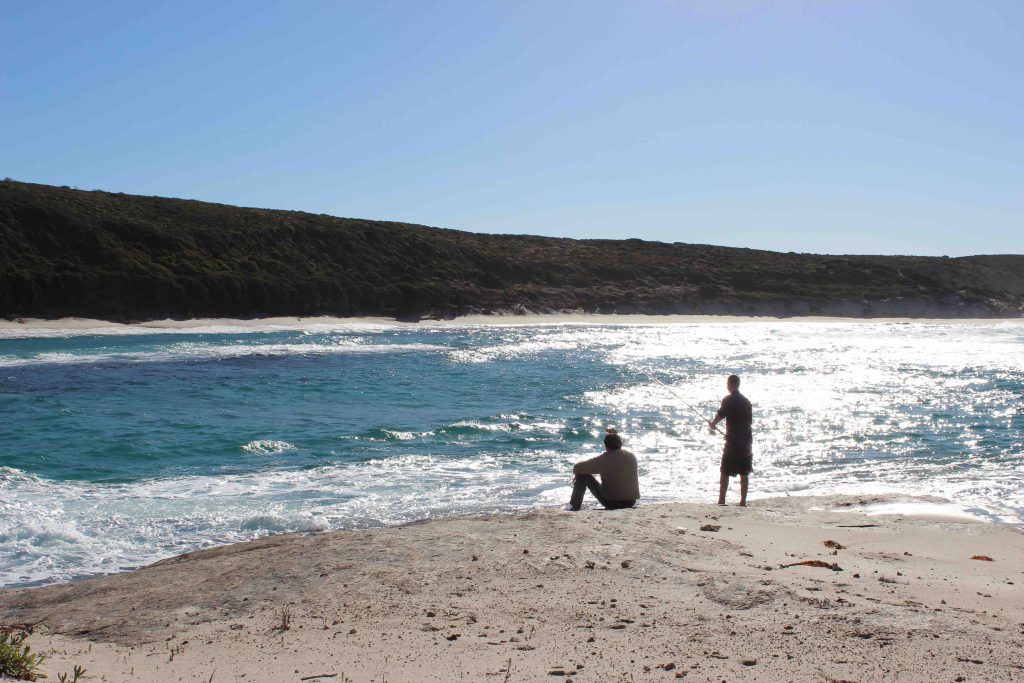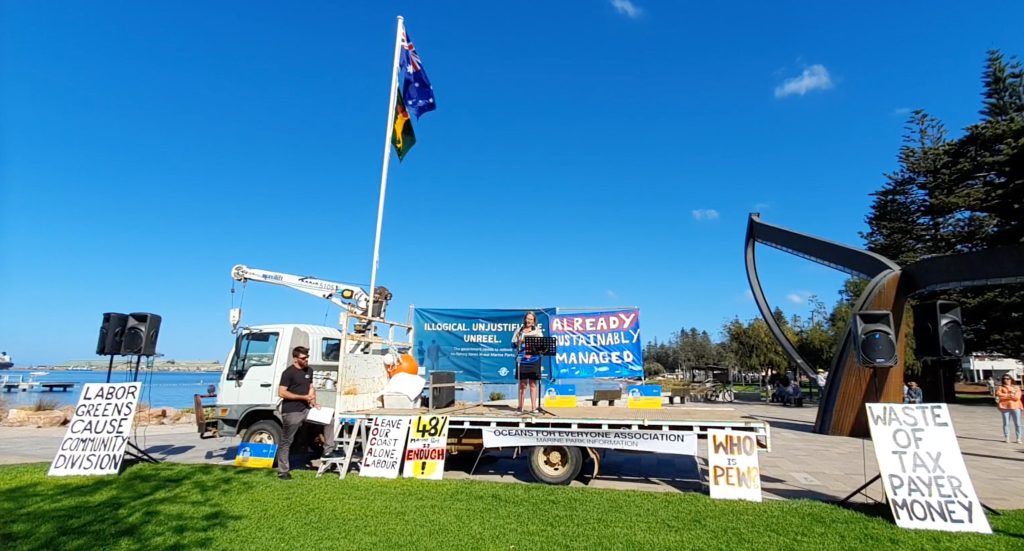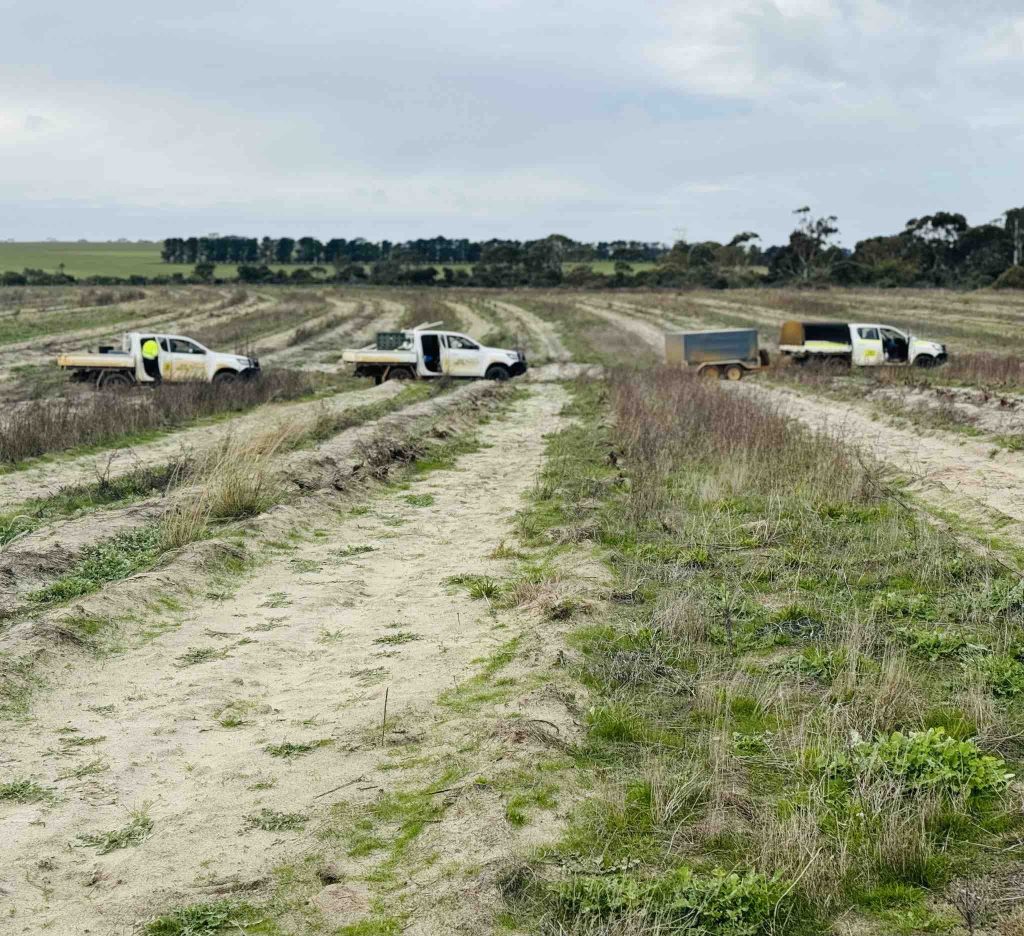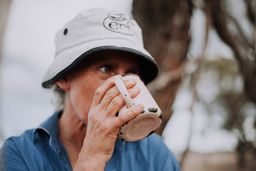On a cold wintry evening in June, a group of people, mostly “wadjelas”, whitefellas like me, have gathered within a small, corrugated iron clad building to show support for an Aboriginal community that is under siege. I assume that those attending are, as I am, disappointed by recent events that have exposed the outwardly racist nature of the place we call home.
A lone voice in a circle of people she may not know, a young Wudjari Nyungar woman’s voice breaks as she describes distress being felt by Aboriginal Elders in Esperance, or Kepa Kurl. Tears are held back as she speaks from a place of pain… pain that has been felt by her people since the arrival of Captain James Cook on Australia’s shores over 200 years ago.
Her Country is in the south east of Western Australia, and she works for the Esperance Tjaltjraak Native Title Aboriginal Corporation (ETNTAC). At the meeting she describes the trauma being experienced by First Nations Elders, family and community as they bear the brunt of political fallout stemming from discussion around the failed WA Aboriginal Cultural Heritage Act (2021); the Referendum on the Voice to Parliament, the proposed South Coast Marine Park and formation of a partnership agreement between the Esperance Shire and ETNTAC. Anna says her community is hurting: its people do not feel safe on their own Country.
During the last two years, several issues have generated debate between political parties, (the Nationals WA, Liberal and Labor), community groups and individual farmers, “fisherfolk” and landholders around access to property, sea and land; all have resulted in an outpouring of racism on social media pages, and in meetings such as a public forum held in the town’s Civic Centre as part of the Heritage Act consultation process.
Online racism has led to the Esperance Shire President, Ron Chambers, expressing disappointment and calling for an end to comments made about the proposed marine park, which will be jointly managed by traditional owners, and the newly forged Shire-ETNTAC partnership agreement.
I don’t know why I am surprised. During catchups, after a few beers (when the curtain over inner beliefs is lowered) we hear the derogatory comments. The “harmless” banter about “blackfellas,” lumped in with the sexist jokes and clichés about dole bludgers living off the means of hard-working Australians. It is nothing new and goes on despite our best efforts at moulding a different kind of dialogue.
I sit in the wooden floored building, itself a vestige of the colonisation process, listening to this brave young woman speaking of the distress her people are feeling, and I am ashamed of my lack of courage. Tears are welling up in my own eyes. But I am conflicted by the self-indulgent nature of my own grief, as we are all a part of this problem.
It is hard to speak out against racism in regional communities during times like these because everyone is connected to everyone else. We know those farmers, landholders, miners, and others opposed to the revised WA Cultural Heritage Act: people who felt threatened by the imposition of laws that they believed would have a negative impact on their livelihoods. We know those who opposed the Voice because they thought they would lose something as a result of a change to the Constitution, and we know those opposed to the creation of the South Coast Marine Park, afraid it will impact on their income earning capacity, their ability to go on camping trips, to fish, walk and drive along the beaches they have regarded as their own for so long. We know those opposed to the Shire and ETNTAC agreement, speaking of increased “red tape” and “delayed decision making” (Esperance Weekender, 31 May 2024, p3).
Feelings are strong. The divide is great. I try to look down the centre of that split and see who is where and why. I have friends and family on both sides, and some acquaintances who are straddling the gap; one foot on each side and a moral compass dangling without direction. On both sides of the chasm are people of varying socio-economic status, but in a Federal electorate where over 75 per cent of the people voted “no” in the 2023 Referendum, it would be fair to assume that there are people from different socio-economic backgrounds protesting against implementation of policies that may afford additional “privileges” to First Nations people, and indulging in racism of some kind. But that is an assumption, and perhaps an unkind one at that.
On one side of the chasm are those who perceive that the pendulum, as so infamously stated by John Howard, has swung too far. They are most likely to be landowners, afraid that the rights of First Nations people will override their own access to land and amenities such as fishing, and among those who probably think enough is being done to compensate for past injustices inflicted upon First Nations people. On the other side of the chasm are those who know a reckoning is nigh. They see the realities of ongoing colonisation evident in health outcomes, in the legal system, housing and education. They know that such a situation cannot go on, especially on land that was never paid for, gained by neither treaty nor trade. We are part of a society that was forcibly planted on top of an existing one, with our lives built over and burying a functioning system of laws, culture, Country and kinship. We are in debt. Accumulating debt and we are not even paying interest, let alone principal.
There is anger in the discussion, and retaliation is swift for those who speak out on social media and call for reasoned debate. We try to get along with one another. We work together, serve alongside one another on community committees, we meet at school pick-ups and drop-offs. We bite our tongues and reman civil. To a point. And beneath all of this, I know that most people honestly do not feel that they are racist, or that any of these debates have racist undertones. They are offended when confronted by the notion. “I am not racist, but…”.
All of the policy proposals mentioned have been framed with good intent: destruction of the Juukan Caves by Rio Tinto prompted revision of the existing laws protecting Aboriginal cultural heritage in WA; the Voice was intended to heal relationships between First Nations people and colonisers; the proposed marine park is intended to protect and enhance the natural resource that is our ocean, and the agreement between the Shire of Esperance and ETNTAC is intended to enable the Shire to move forward in the spirit of reconciliation and recognition. But policy and politics often collide and good intentions, when poorly implemented, can cause harm.
Public protests have been held decrying the proposed marine park. Signs at rallies regarding the proposed marine park read “Labor, Greens, cause community division”. “No one owns the sea! Keep Esperance free”. The local Civic Centre was overflowing with people keen to object to the WA Cultural Heritage Act 2021, and the Referendum saw people in the Esperance region voting “no”, decisively. And local Facebook hosted community pages are peppered with innuendo, misinformation and blatant racism. It is a striking contrast to the outwardly peaceful nature of place that surrounds us. Esperance is a town free of issues that fill daily news feeds from places like Alice Springs, but it is tainted by what can only be described as ingrained racism.
This is an observation that is denied. I have spoken to people that are insulted that such an accusation would be levelled against people in a place that considers itself welcoming, but the reality is that Aboriginal people are being marginalised during debate that prioritises the voice of white settler landowners, be they farmers or townspeople. This is not unusual: it was the ignoring of the First Nations voice that resulted in the destruction of Juukan Gorge in the first place. Speaking to the ABC, ETNTAC chief executive Peter Bednall said that the release of the South Coast Marine Park Management plan had generated “hundreds of racist comments and reactions”, and claims made via social media included allegations that “Aboriginal people planted artefacts on nearby islands and that research of cultural material in the Recherche Archipelago would be used as a political tool to expand the marine park”.
It is hard to fathom where this attitude comes from. On the other hand, it may be much too obvious. Esperance is, by all standards, a place of wealth and security. Its isolation, afforded by a seven-hour drive from the capital city of Perth (next stop, the Nullarbor) has forced a degree of independence and resourcefulness. It is free of the trappings of complicated metropolitan life, and people feel safe here. But there is crime, and there are Aboriginal people among the white people appearing in the town’s Magistrate’s Court once a month. Court reporting provides a window into the nature of crimes in community, and over the years I have often been surprised by who appears in the dock: there is diversity among those facing judgement, including non-Aboriginal members of the community, appearing on charges ranging from stalking, assault, theft and trespass.
Esperance’s Aboriginal community has worked hard to keep its people safe. It took 18 years of negotiation and legal process to resolve the Esperance Nyungar Native Title claim. Executed in March 2014, the Esperance Nyungar Agreement covers approximately 29,000 square kilometres of land in the Goldfields-Esperance Region. It followed a determination by the Federal Court that the Esperance Nyungar people hold Native Title rights over 27,000 square kilometres of this area. ETNTAC, also known as Tjaltjraak, is the Prescribed Body Corporate which, as it states clearly on its website, acts as the “lead body for Kepa Kurl Wudjari people, our work empowers our members to build stable, purposeful, culturally connected lives. Our land and sea country programs produce tangible benefits across enterprise, the environment and the community through the re-connection of people, country and culture. We enable partner organisations to deliver more effective, culturally secure regional services, particularly within the health and community sector”. According to ETNTAC’s own website, “the inclusive and culturally secure governance structures and processes have united families and provide the foundation for positive change in the Esperance region”.
ETNTAC’s Facebook pages feature positive and uplifting stories about its projects and people, including updates on tree planting projects, archaeological and anthropological works, and driver training programs. It is a humming space of positivity and engagement. This is especially important when, as Peter Bednall pointed out to the ABC, “Aboriginal people are five times more likely to be unemployed in this town than non-Aboriginal people”. With a wealth discrepancy described as “stark”, long-term opportunities such as those that may eventuate from co-management of the proposed marine park are, as he says, needed to “close the gap in life outcomes” and enable ETNTAC to continue its goal of making “positive change”.
But instead of generating a sense of pride within the wider community, work being done by groups like ETNTAC, the Mudjar Aboriginal Corporation and allies, open the First Nations community to attacks from those who think Aboriginal people are unjustifiably treated differently; favoured ones for whom life is made easier. The “tall poppy” syndrome that Australia is infamous for appears to have morphed into a form of racism, one which purposefully ignores the challenges faced by First Nations people because of colonisation, and which sees efforts being made to achieve equity as an affront to equality.
When issues related to land ownership arise in the political arena, it does not matter how much positivity the region’s Aboriginal community, through the work of ETNTAC, Mudja and partnering organisations, brings to the table, subtle and overt racism rises to the surface. This may be made more obvious by social media and perpetuated by a lack of understanding of native title and land rights in Western Australia.
Emotions ran high in Esperance as residents contemplated the impact of a proposed marine park on their community. Source: Facebook.
While social media itself can be blamed for some of this, there is another presence that has consolidated pre-existing division in the community. The arrival of Sky News. For many years, those of us living in regional Australia garnered our news and information from a radio, often sitting on the top of the fridge. ABC news bulletins were part of our lives. Newspapers were delivered infrequently, but well read, and the TV, when it worked, broadcast one, two or three free to air stations at best, depending on the height of the TV antennae installed on the home. Where I lived, we were lucky to get the ABC, others received Channels 7 and 9. Years have passed, internet has created vast opportunities for learning… and misinformation.
In the lead up to the Referendum on the Voice to Parliament and during discussions with local people, usually held on the steps of the local Post Office as we checked our mail boxes, it was pointed out to me that some rural and regional families have become avid consumers of Sky News… and it has hardened their existing right-wing outlook. As the WA Cultural Heritage Act 2021 was in the throes of being implemented, with criticism from both Aboriginal people and other political parties adding to the debate, stories run on Sky News fomented an already difficult situation. They served to dampen any latent “left-wing” leanings, over-riding empathy with fear driven, colonial logic and, dare we say, white supremacy.
We saw dramatic headlines and angry reporting such as Andrew Bolt, July 24, 2023, “WA Farmers slam Aboriginal Cultural Heritage Act for preventing ‘major work’ on properties”; Peta Credlin, August 3, 2023, “WA Cultural Heritage Act is ‘socialist state gone mad’”; Amanda Stoker, July 17, 2023, “WA’s cultural heritage legislation just a ‘fraction’ of what can be expected with Voice”. Eventually the changed act was repealed, and the Aboriginal Heritage Act 1972 was restored, albeit slightly modified. This remains contentious as the State still has the final say on decisions regarding destruction of Aboriginal cultural heritage sites. And the damage to the vote for the Voice was done.
It may not be that Sky News is changing people’s opinions and outlooks, but in an area that is staunchly conservative, it is a news source that serves to consolidate ‘right wing’ views. Writing in The Media, Margaret Simons dismisses fears that Sky News, is “taking Australia by storm”. She notes that since 2014 rural viewers have been able to access Sky News free-to-air on either WIN or Southern Cross Austereo. And while she says this might “raise the spectre of a US-style political division”, with those in rural and regional areas treated to a “very different set of ‘facts’ and opinions”, she assures us the audiences are only modest. However, as she says, “News Corp’s right-wing commentators form part of the background rumble to public and political life in Australia”. On this channel, they are at their “most florid and least constrained by the traditions and disciplines of the conventional newsroom”. And when their hosts are literally banging their fists and talking about people losing their property rights because of a cultural heritage act, that background rumble, unrestrained by facts, becomes enough to create an earthquake in an already fragile countryside.
All this is background material, but it leads up to the current situation, where we see a sector of our community feeling besieged by affronts to their own rights, including the failed WA Cultural Heritage Act (2021). They were fearful of what the Voice to Parliament might bring and comforted by the high percentage of people who voted against it. They are angered by the proposal to create a marine park, one which will be co-managed by ETNTAC, and goaded further by the thought of the same organisation working in partnership with the Shire of Esperance. It is no wonder that Facebook community pages and individuals are sharing posts and comments that are clearly racist in nature. Yet the changes that are being thrust upon the people of Esperance, and other places, are not necessarily of First Nations making. They are the people bearing the brunt of fallout from changing policy, poorly introduced and implemented, and community backlash. They are soft targets for the furious.
The young woman seated with us had one message when she addressed us at that meeting in the Museum Village; we don’t know what to do about this, and we need your help. The problem is, we wadjelas don’t really know what to do about it either. The grip that social media and political affiliation has on people’s beliefs is a hold hard to break. The more work done to achieve equity, even as colonisation stealthily continues by virtue of our existing socio-economic system, the more we feed into the narrative that Aboriginal people are treated as more than equals. It is a situation which is frustrating and so destructive of goodwill. The dilemma is one which is not just being faced by those in the place where I live. It is a problem we all need to be solving.
It is not all bad in Esperance, with a group of dedicated optimists pursuing the implementation of a Compassionate Community Charter intended to foster a healthier and stronger community. Graduates of the Leading Australian Resilient Communities (LARC) program, these leaders are keen to see a charter embraced by the community. Following involvement in the LARC program – a collaboration between the Australian Rural Leadership Foundation (ARLF), Regional Australia Institute(RAI) and Leadership WA that involved intensive leadership development and mentor supervised work on a chosen community project – Esperance’s graduates were determined to make the Compassionate charter a reality. Backed by the local shire, the charter serves as a set of guiding principles to help decision-makers identify and prioritise programs to improve community health and wellbeing, resilience and connection. Those who initiated the charter concept in Esperance are hoping that it will also discourage racism. Esperance Compassionate Community Charter group members Lori-Ann Shibish, Meredith Waters and Kelly Brady are reported as saying that “Esperance had plenty of room for improvement”. The trio told the ABC that “calling out racism, intimidation, slander and fearmongering was not up to politicians alone, but school leaders, sporting groups, the shire or anyone willing to show leadership”. But we are yet to see the real impact of this empathy fostering initiative.
Planting trees on Country, Kepa Kurl / Esperance. Source: Facebook.
At the end of his book Killing for Country, David Marr describes the conquest of Australia as the “most brutal invasion in the nineteenth-century Empire”. Land was taken, people were killed, no treaties were made, no wealth was returned to the original owners of the country it was earned on. “And when the fighting was over, we set about forgetting how Australia was won.”
The need for the telling of truth was raised among those attending the Museum Village meeting in Esperance, but how do we set about enabling the truth to be told, when as the outcome of the Referendum on the Voice to Parliament proved, so many people do not want to listen?
We are asking a great deal of these people, the Traditional Owners of our land, those who have lost so much and are expected to turn a blind eye to the bigoted. And now we have been asked to help, and it is up to us to work out how we can be true allies, guided by the Traditional Owners and emerging leaders.
As someone who moved to Australia with my family when I was only seven years old, I could easily deny any responsibility for colonisation in this country. But the reality is that I cannot. By my very existence as a white person on this land, encouraged to come here as part of a policy that deliberately set out to fill land that was ‘terra nullius’ with people who were of European descent, I am as complicit as anyone else. The fact that colonisation continues, hand in hand with real-time racism and denial of our brutal history, is a tragedy. The tears I shed in that small settler constructed building came from deep inside me. This is not just about Australia’s First Nations people. Those tears were borne of a sense of so many lost opportunities: chances we have had to repair damage done, and to prevent damage being done. Here, in our home, to First Nations people and to our environment, and further afield where others, including people in Gaza and the West Bank, are enduring even bloodier consequences of colonisation. And globally as politicians literally play with fire as they avoid committing to real action on climate change, or on aggression, or on our ability to live dignified lives.
During our gathering it was suggested that an “ally” action might be something as simple as wearing a button or a T-shirt that states that the land was theirs, and always will be. An outward display of kinship and connection. Though we mean well, such actions seem like such a trite response to issues that have provoked such deep anguish and had such a profound impact.
In the days since that meeting, we have talked amongst ourselves, those of us that were there, wondering out loud about how to declare and define our ally-ship. It is one thing to counter negativity on social media: online action is not so daunting. But the challenge is to take action that is visible as part of lives we live daily. Our spoken words; our unspoken actions. Enabling the truth to be told, honestly and often, so that it is heard and understood, and so that our national psyche enables change because we understand why we are the way we are. And how we got to stand where we stand.
We can listen, collectively, amplify voices and honour the consistent request for self-determination, fight to provide the support to enable it, and allow First Nations people to live lives filled with dignity and respect. Traditional Owners and emerging leaders deserve that. The ‘no’ vote in the 2023 referendum may have denied them a constitutional Voice, but we must listen to them now, on their Country, and work with them to heal the damage done during the last two centuries.
Dodie Henderson is a freelance writer who lives with her family on a farm near the Dalyup River, where they run Angus cattle and raise Australian Stock Horses. Though she grew up on farmland in the Western Australia’s wheatbelt, her family farmed in Scotland and England before making the journey to Australia decades ago. With a Masters in Sustainable Development behind her, Dodie now works as a journalist, as a researcher in a politician’s office and in education. But her happy place is on the land and working with Esperance based natural resource management teams and land care projects in an effort to help restore and preserve the natural world so damaged by unsympathetic policies of the past.
Image credit. Feature image courtesy of Dodie Henderson.




A wonderfully thoughtful essay and powerful piece of journalism .